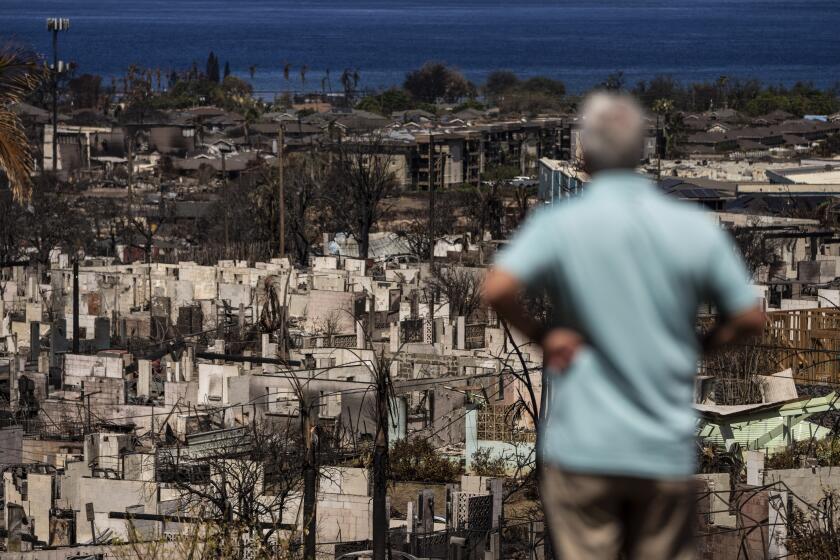CDC’s Point Man on Smoking Knows His Foe--He Was There
Michael Eriksen, one of the nation’s most powerful anti-smokers, understands how difficult it is to quit. Dreams of a long draw of nicotine still invade his sleep, 20 years after he took his last puff.
“I’ll always consider myself as someone who smoked and understand how important cigarettes are, the role they can play in your life,” said Eriksen, who directs the Office on Smoking and Health of the federal Centers for Disease Control and Prevention.
His office gives the Surgeon General and the Food and Drug Administration data to wage their fights against smoking. Recently, he advocated anti-tobacco legislation and higher tobacco taxes.
Eriksen’s own experience parallels that of many former smokers. He picked up smoking from a friend, felt the same pressure in reverse to quit, and finally kicked the habit after a relative died of cancer.
Perhaps in part because of his background, he encourages his office to be understanding and supportive of the country’s 100 million current and former smokers, instead of trying to punish them.
He acknowledges how difficult it can be to recognize that the addiction kills more than 400,000 people a year.
The push to make smokers pariahs only worsens the situation, he believes.
“The tobacco wars are as adversarial and with as little potential for compromise as any example I can think of. I think that’s to the detriment of some solutions.”
He abhors the tobacco companies’ decision to turn smoking from a health issue into a civil rights battle that feeds resentment.
“It just blows my mind to think that you could ever couch an addiction as a freedom, but they’ve been able to,” he said.
Eriksen says he’s not out to ban smoking. Instead, he wants to prevent children from smoking and to increase taxes and regulations on tobacco to discourage its use.
“People will look back on this time in history, and they’ll say, ‘Why did you allow the leading cause of death . . . to go basically unregulated?’ And we’ll know why--the industry is so influential and has so much money. That’s not right, but it’s hard to change.”
Just as hard as quitting smoking, he says.
Eriksen stills dreams about smoking, although the craving disappears during the day.
Quitting is Eriksen’s second-greatest accomplishment, after the birth of his son, Michael, on the day of last year’s Great American Smoke-Out, Nov. 18.
He started smoking in 1968, after nagging his parents for years about their smoking. He picked it up in college when his girlfriend, a smoker, asked him to keep her Marlboros.
“I decided I was just interested in what was so special about smoking, so I tried one. I got dizzy, headache, that was the beginning of it.”
It became a pack-a-day habit.
He continued to smoke--in class, at restaurants, at parties and, later, during breaks from teaching in Baltimore’s public schools.
Teaching failed to satisfy his need to do good. He returned--still smoking--to the Johns Hopkins University for a master’s degree in public health.
Eriksen became the last holdout among his friends. For more than a year, he considered quitting. He knew the consequences.
“That bothered me--the dissonance between what I knew and what I did,” said Eriksen, who trained as a psychologist. “I reached the point where I felt that I did not have control of my right arm, because I’d be thinking, ‘I don’t want to smoke, I don’t want to smoke,’ and I’d watch my arm reach for the pack of cigarettes.
“I wanted to quit, but not hard enough to stop.”
Eriksen knows well that cancer statistics often fail to convince a smoker to quit.
“There needs to be some catalyzing reason for them to go through with the effort to quit smoking.”
For him, it was his uncle’s death from stomach cancer in 1974.
“He never smoked, never drank, never had any type of vice, but developed cancer anyway.”
On his deathbed, the uncle asked him to do something about cancer.
“At his funeral, I realized that here I am, 24 years old, healthy, educated, had everything going for me, and I’m smoking these stupid cigarettes which I know are going to cause me cancer,” he said.
“I quit that day. I never even held a cigarette since.”
More to Read
Start your day right
Sign up for Essential California for news, features and recommendations from the L.A. Times and beyond in your inbox six days a week.
You may occasionally receive promotional content from the Los Angeles Times.






